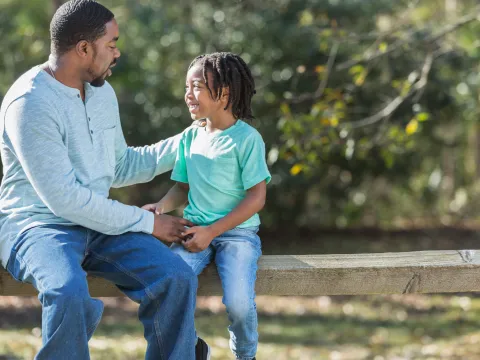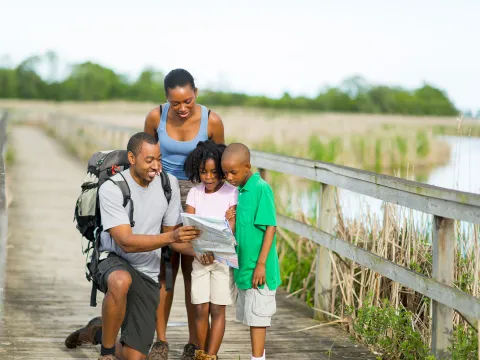- AdventHealth

Bullying can be a major problem for children today, but how do you recognize the signs and what can be done to prevent and treat it? To find out, we spoke with board-certified pediatrician and adolescent medicine specialist, Heather Elizondo Vega, MD.
Spotting the Signs of Bullying
How can I identify if my child is being bullied?
Dr. Elizondo Vega: Common signs of bullying are depression, anxiety, reluctance to engage socially, and unexplained injuries. Changes in behavior, avoiding activities, emotional disturbances and a decline in school performance are also good indicators your child may be being bullied.
Children will rarely come right out and tell you they’re being bullied. Often, you’ll have to use synonyms to ask the question or pose it from a different perspective. So, instead of asking your child if they’re being bullied, ask them if they’ve seen anyone being harassed or picked on. These questions can help them open up about what they’re experiencing.
Are there common physical signs of bullying?
Dr. Elizondo Vega: I’ve rarely seen any physical signs in the course of my career, but just in case, the things to look for are unexplained bruises or injuries, torn clothing or backpacks and missing or broken personal items. However, the body’s natural response to emotional stress is most common, resulting in headaches, stomachaches and general anxiety.
What are some side effects of bullying?
Dr. Elizondo Vega: The most common side effects of bullying are sadness or depression, anxiety, school avoidance, stomachache and headache which are typical responses to stress and anxiety, and can cause frequent trips to the school nurse. Poor academic performance can also be a consequence as well.
If I suspect my child is being bullied, how can I get them to talk to me or report it?
Dr. Elizondo Vega: Kids are afraid their parents will freak out, run to the school and make a big deal out of it if they tell them. It’s important to express a relaxed approach and maintain a calm attitude when talking to your child about being bullied.
How do I start a conversation about bullying with my child?
Dr. Elizondo Vega: Don’t start with a direct question, ask around it. Ask about the general social structure at their school. Ask about their friends and get more specific as you go on. Start with questions like, “Have you seen it happen to someone else?” From there, work your way up to, “Has it ever happened to you?”
How to Deal with Bullying
What can I do if my child is being bullied?
Dr. Elizondo Vega: I recommend speaking to someone at their school if you find out your child is being bullied. Start with the school’s office staff and guidance counselor. It may trickle down to the individual teachers based on what procedures they have in place. A paper trail should be started to record it and continue recording, so the matter can be documented and handled properly. Having open lines of communication with the school is important. I think most schools will take it very seriously, given how much talk there’s been about this subject in recent years.
If the school isn’t helping you, you may need to escalate to another level of administration, such as the school superintendent. If the teacher, guidance counselor or principle hasn’t helped or acknowledged the problem, you can often get help from an educational advocate.
Educational advocates are independent representatives and can be helpful if you find you’re unable to convey the nature of the problem to the school, and feel as though you’re not getting the help your child needs. If the bullying goes too far and becomes harassment, it may require involving the police.
Ultimately, your child needs to have someone they feel they’re safe with, so if they need to take a break, go vent or get out of a certain situation, they have someone they can go talk to. Also, the school needs to be aware of what’s going on.
How should parents address cyberbullying?
Dr. Elizondo Vega: I recommend putting off social media exposure until later in your child’s life. If your child does have access to social media, I recommend that you monitor their use closely, and discourage group texts and chats. Group chats can create a snowball effect where one person in the group is attacked, perhaps even playfully at first, and the rest of the group joins in and ends up with the targeted child getting hurt. If a group chat or text is necessary for a school project, be sure to monitor it.
The most important thing in dealing with cyberbullying is to block the offender immediately. A lot of the time victims will keep going back to see what is being said about them when they should just ignore it. Continued exposure to the bullying will only make it worse.
Preventing Bullying
What causes bullying?
Dr. Elizondo Vega: At the very core of bullying, you have a power differential. The power differential can come from differences in the social hierarchy at school or from physical differences. An aggressive home life consisting of physical abuse, physical discipline or other problems at home can also cause children to lash out at those they feel they have some sort of power over.
Who’s at risk for being bullied?
Dr. Elizondo Vega: Bullies tend to go after children with low self-confidence to begin with or anything else that makes them different. Depression, anxiety and low self-confidence seem to be magnets for repetitive bullying in the first place.
Nurturing and building confidence are great ways to prevent bullying. Help your child feel confident by stressing the things they excel at. Whether it be academics, sports, music or art, be sure to put emphasis on these elements in their life to build their confidence.
What else can be done to prevent my child from being bullied?
Dr. Elizondo Vega: A basic protective factor to prevent becoming the victim of bullying is having your child expand their social groups and not just hang with one small clique. Having a wider group of friends gives them options and minimizes the chance of them feeling stuck if that one small group happens to turn on your child.
Also, encouraging your child to get involved in a variety of extracurricular activities with a variety of different people gives them more options, as well. Activities like sports, music or other school-sponsored activities are a great way for your child to broaden their social sphere.
If school isn’t a comfortable place for them, try looking elsewhere to get them connected socially in another organization like the YMCA or Boys and Girls Club, which tend to do a lot of after-school programs. Faith-based youth programs are another positive way for your child to make new friends and interact in a safe space.
The important thing is for them to have somewhere they feel comfortable and can make friends outside of their school setting.
What are some strategies to reinforce messages of kindness, acceptance and inclusion at a young age?
Dr. Elizondo Vega: From the very beginning, it’s important to teach your children the importance of empathy toward others, as well of acceptance of the things that make us different. It starts with asking your child, “How would you feel if someone did that to you?” Forgiveness should also be stressed, so a one-time incident isn’t looked at or interpreted as bullying and can be moved past more easily.
Schools should also have educational policies around bullying in place from an early age, and the guidance counselors should have proper training as well.
Understanding the Nature of Bullying
Do you think bullying is becoming more common or are people less tolerant of it now?
Dr. Elizondo Vega: I think people are less tolerant of bullying due to there being more awareness around it these days. And with cyberbullying, there’s more proof and an easy-to-follow paper trail.
Speak with a Specialist
If you think your child is being bullied, seek the guidance of your pediatrician and discuss any issues your child may be having with bullying.
To speak with Dr. Elizondo Vega or another one of our world-class pediatricians about bullying or any other element of your child’s whole health, please visit AdventHealth for Children or call Call407-303-5437.


